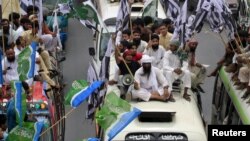ISLAMABAD — Thousands of hardline religious activists marched to Pakistan’s capital Monday to protest the government's decision to re-open NATO supply routes into Afghanistan. Improved political ties between the United States and Pakistan has galvanized the right-wing opposition.
Abdullah Gul, a member of the Defense Council of Pakistan, an alliance of more than 40 political and religious groups leading the rally, said supporters will not allow NATO supply trucks to drive through Pakistan into Afghanistan.
“We want to stop the NATO supplies lines at any cost, because this is right now directly an attack on the sovereignty of Pakistan and nothing can be compromised on the sovereignty of Pakistan,” said Gul.
The protest march began in the eastern Pakistani city of Lahore on Sunday, and Gul said the rally has gathered as many as 200,000 followers, with many calling for "jihad" or a holy war against America. Police earlier estimated the crowd at closer to 8,000.
Taking part in the protest is the former head of Pakistan’s intelligence services, Hamid Gul, and Hafiz Saeed, the leader of the banned Lashkar-e-Taiba militant group, blamed for the 2008 terror attacks in Mumbai, India.
Protest leaders are trying to take advantage of a general dissatisfaction with President Asif Ali Zardari’s government and increased anti-American sentiment among the Pakistani public. In a recent Pew report, three out of four Pakistanis surveyed consider the United States an enemy.
Saifullah Mahsud of the FATA Research Center in Islamabad dismissed the rally as election year politics.
"I think it’s another attempt on their behalf to perhaps to get as many votes as they possibly can based on the anti-American sentiment in the country," Mahsud said. "Apart from that, I don’t think this is going to make much of a difference as far as the policy of Pakistan’s government goes.”
Gul said Pakistani security forces would not be able to protect the supply route. He said protesters would take any measures short of violence to stop the NATO trucks from reaching Afghanistan.
“No one can protect these and definitely we will go in front of the trucks, we will lay own on the roads and we will stop them, they will not run across our bodies, it’s not going to be like this, we are not going to use any arms or ammunitions,” Gul said.
Pakistan re-opened the NATO supply routes after U.S. Secretary of State Hillary Clinton said the U.S. administration was “sorry” for U.S.-led coalition airstrikes that mistakenly killed 24 Pakistani soldiers last November.
Clinton last week acknowledged that despite the breakthrough deal on the supply route, Washington’s relationship with Islamabad still faced a number of challenges.
Gul said the Pakistani government has lost its credibility and that a government following Islamic laws should be in power. He said the Defense Council planned to stage a sit-in in the capital to force the current leadership to leave.
Abdullah Gul, a member of the Defense Council of Pakistan, an alliance of more than 40 political and religious groups leading the rally, said supporters will not allow NATO supply trucks to drive through Pakistan into Afghanistan.
“We want to stop the NATO supplies lines at any cost, because this is right now directly an attack on the sovereignty of Pakistan and nothing can be compromised on the sovereignty of Pakistan,” said Gul.
The protest march began in the eastern Pakistani city of Lahore on Sunday, and Gul said the rally has gathered as many as 200,000 followers, with many calling for "jihad" or a holy war against America. Police earlier estimated the crowd at closer to 8,000.
Taking part in the protest is the former head of Pakistan’s intelligence services, Hamid Gul, and Hafiz Saeed, the leader of the banned Lashkar-e-Taiba militant group, blamed for the 2008 terror attacks in Mumbai, India.
Protest leaders are trying to take advantage of a general dissatisfaction with President Asif Ali Zardari’s government and increased anti-American sentiment among the Pakistani public. In a recent Pew report, three out of four Pakistanis surveyed consider the United States an enemy.
Saifullah Mahsud of the FATA Research Center in Islamabad dismissed the rally as election year politics.
"I think it’s another attempt on their behalf to perhaps to get as many votes as they possibly can based on the anti-American sentiment in the country," Mahsud said. "Apart from that, I don’t think this is going to make much of a difference as far as the policy of Pakistan’s government goes.”
Gul said Pakistani security forces would not be able to protect the supply route. He said protesters would take any measures short of violence to stop the NATO trucks from reaching Afghanistan.
“No one can protect these and definitely we will go in front of the trucks, we will lay own on the roads and we will stop them, they will not run across our bodies, it’s not going to be like this, we are not going to use any arms or ammunitions,” Gul said.
Pakistan re-opened the NATO supply routes after U.S. Secretary of State Hillary Clinton said the U.S. administration was “sorry” for U.S.-led coalition airstrikes that mistakenly killed 24 Pakistani soldiers last November.
Clinton last week acknowledged that despite the breakthrough deal on the supply route, Washington’s relationship with Islamabad still faced a number of challenges.
Gul said the Pakistani government has lost its credibility and that a government following Islamic laws should be in power. He said the Defense Council planned to stage a sit-in in the capital to force the current leadership to leave.





